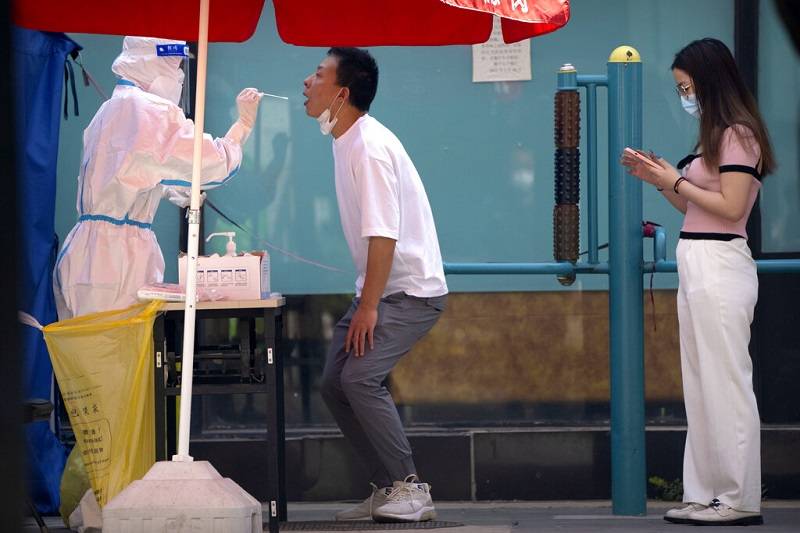
A worker wearing a protective suit swabs a man’s throat for a COVID-19 test at a testing site during the second consecutive day of mass testing in Beijing, Wednesday, May 4, 2022.
17:26 JST, May 4, 2022
Beijing on Wednesday closed around 10% of the stations in its vast subway system as an additional measure against the spread of coronavirus.
The subway authority in a brief message said only that the measure to shut 40 mostly downtown stations was being taken as part of epidemic control measures. No date for resumption of service was given.
Beijing has been on high alert for the spread of COVID-19, with restaurants and bars limited to takeout only, gyms closed and classes suspended indefinitely. Major tourist sites in the city, including the Forbidden City and the Beijing Zoo, have closed their indoor exhibition halls and are operating at only partial capacity.
A few communities where cases were discovered have been isolated. People residing in “controlled” areas have been told to stay within city limits, including 12 areas deemed high-risk and another 35 considered medium-risk.
City residents are required to undergo three tests throughout the week as authorities seek to detect and isolate cases without imposing the sort of sweeping lockdowns seen in Shanghai and elsewhere. A negative test result obtained within the previous 48 hours is required to gain entry to most public spaces.
Beijing on Wednesday recorded just 51 new cases, five of them asymptomatic.
The subway closings should have relatively little impact on city life, with China observing the Labor Day holiday this week and many commuters in the city of 21 million already working from home.
In one downtown neighborhood categorized as high-risk on Wednesday, the streets were practically deserted apart from a few delivery drivers on scooters and the occasional pedestrian and car.
All businesses were shut except for supermarkets and fruit and vegetable stores. Outsiders generally avoid high-risk areas to avoid the possibility of their presence registering on the tracing apps installed on virtually all mobile phones, creating potential problems for future access to public areas.
While taking a lighter touch in Beijing, China has overall stuck to its strict “zero-COVID” approach that restricts travel, tests entire cities and sets up sprawling facilities to try to isolate every infected person. Lockdowns start with buildings and neighborhoods but become citywide if the virus spreads widely.
That has caused the most disruption in Shanghai, where authorities are slowly easing restrictions that have confined most of the city’s 26 million people to their apartments, housing compounds or immediate neighborhoods for close to a month, and in some cases longer.
Shanghai reported another 4,982 cases Wednesday, all but 260 of them asymptomatic, along with an additional 16 deaths. That continues a steady decline in China’s largest city which recorded a daily peak of 27,605 new cases nearly three weeks ago on April 13.
The surprisingly low death toll amid an outbreak of more than 400,000 cases in the city that is home to China’s main stock market and biggest port has sparked questions about how such deaths are tallied.
The rigid and widely derided restrictions have led to shortages of food and medical aid along with a wider — though likely temporary — impact on the national economy. Desperate, outraged citizens have confronted authorities at barricades and online, screamed out of their windows and banged pots and pans in a sign of their frustration and anger.
Communist authorities who tolerate no dissent have sought to scrub such protests from the internet and blamed the protests, including the banging of cooking implements, on agitation by unidentified “foreign anti-China forces.”
Top Articles in News Services
-

Prudential Life Expected to Face Inspection over Fraud
-

Hong Kong Ex-Publisher Jimmy Lai’s Sentence Raises International Outcry as China Defends It
-

Japan’s Nikkei Stock Average Touches 58,000 as Yen, Jgbs Rally on Election Fallout (UPDATE 1)
-

Trump Names Former Federal Reserve Governor Warsh as the Next Fed Chair, Replacing Powell
-

Suzuki Overtakes Nissan as Japan’s Third‑Largest Automaker in 2025
JN ACCESS RANKING
-

Japan Institute to Use Domestic Commercial Optical Lattice Clock to Set Japan Standard Time
-

Israeli Ambassador to Japan Speaks about Japan’s Role in the Reconstruction of Gaza
-

Man Infected with Measles May Have Come in Contact with Many People in Tokyo, Went to Store, Restaurant Around When Symptoms Emerged
-

Prudential Life Insurance Plans to Fully Compensate for Damages Caused by Fraudulent Actions Without Waiting for Third-Party Committee Review
-

Woman with Measles Visited Hospital in Tokyo Multiple Times Before Being Diagnosed with Disease























